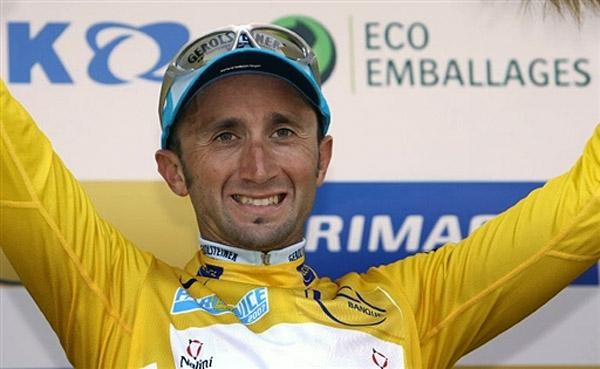Gerolsteiner's year in review
The 2007 season wasn't the best in the history of Team Gerolsteiner. It started out slowly and ended...

The 2007 season wasn't the best in the history of Team Gerolsteiner. It started out slowly and ended with the news that the sponsor would not renew its contract which expires after the 2008 season. There were few highlights in the year for the team in the blue jerseys, but for a week in April they were top.
Veteran Davide Rebellin started the year strong, with a number of top five finishes. He took over the leader's jersey in Paris-Nice, which he wore for three days, losing it on the final stage and ending up second overall. The team's other big gun, Stefan Schumacher, was coming into form at the same time. He presented the team with its first season win at the fifth stage of Tirreno-Adriatico, and took over the leader's jersey. He only held it for one day, finishing fourth overall.
Rebellin and Schumacher led Gerolsteiner into Milano-Sanremo with great hopes, but as the team itself said, it turned out not to be team's race. Both captains finished in the leading group with the same time as winner Oscar Freire, but the German was 16th and the Italian 30th. The race was marked for the team not by good results but by horrible crashes. Andrea Moletta broke his femur, knocking him out of action for several months. Only minutes later David Kopp went down, and although serious head injuries were at fist suspected, he came out with the worst being a broken nose.
Amstel Gold Race proved to be the team's absolute season highlight, as Schumacher and Rebellin finished first and second. The two were in a high-powered escape group with Michael Boogerd, Paolo Bettini, Danilo Di Luca and Alessandro Valverde, among others. "Schumi" took off about three kilometers before the finish, and let the others gamble behind him, waiting for each to attack. The day brought another victory, as Rebellin moved into the ProTour overall lead. Only three days later Rebellin won his second Flèche Wallonne, again beating Valverde and Di Luca.
The team hoped to repeat its successes in last year's Giro d'Italia, when they won three stages and Schumacher wore the leader's jersey for two days. Their results were more modest in 2007, with sprinter Robert Förster winning one stage. Rebellin dropped out after only 10 stages, and by the 17th stage the team was down to only four riders in the race.
Back in Germany, the long shadows of the past were casting themselves on the team. Sport Director Christian Henn and Directeur Sportif Udo Bölts, both of whom rode for Team Telekom, joined the ranks of those confessing to having used doping products during the 1990s. At his own request, Bölts' contract with the team was dissolved.
On the brighter side, Stefan Schumacher won the overall title in the Bayern Rundfahrt. And the team was able to boast of two national champions, in Beat Zberg (Switzerland) and Fabian Wegmann (Germany).
The latest race content, interviews, features, reviews and expert buying guides, direct to your inbox!
July means, of course, the Tour de France, a race which has never quite worked out right for Gerolsteiner. This year the team was looking to Marcus Fothen, who finished 15th last year, with Stefan Schumacher, Förster, and climber Bernhard Kohl all considered good possibilities for a stage win. It didn't happen, though. Fothen finished 34th, and brought in the team's best stage finish, coming in second in Stage 17. Kohl finished 31st overall, as the team's best.
Things picked up in the second half of the season, as Förster won the first stage of the Deutschland Tour, and Beat Zberg won the first stage of the Tour de l'Ain. Davide Rebellin dominated the Brixia Tour, winning the first stage for the third year in a row, and never giving up the overall lead. The race also saw Moletta's return to action after his Milano-Sanremo crash.
The Vuelta a España didn't provide any wins for the team either, but young Tom Stamsnijder came closest, as he finished second in the 13th stage, when T-Mobile's Andreas Klier took the breakaway win. In the end, the best Gerolsteiner rider was newcomer Oliver Zaugg, who finished 15th overall.
Schumacher was using the Vuelta to prepare for the World Championships in his hometown of Stuttgart, Germany. He went into it with the goal of winning, and came close to achieving that goal, finishing third. But the win was overshadowed by the later announcement that he had shown irregular blood values in unannounced doping controls before the Worlds. They were due to a bad case of diarrhoea, he explained, and he received no official sanctions, but German fans had become over-sensitised to anything to do with doping, and many questions remained.
The ultimate piece of bad news for the team came during the Vuelta when, as expected, sponsor Gerolsteiner Brunnen GmbH & Co. announced that it would not extend its sponsorship contract which expires the end of 2008. The company emphasized that its decision was not associated with doping, but the spectre of doping, especially in German cycling, is expected to make it more difficult for Holczer to find a new sponsor, although he has repeatedly expressed his optimism.

Laura Weislo has been with Cyclingnews since 2006 after making a switch from a career in science. As Managing Editor, she coordinates coverage for North American events and global news. As former elite-level road racer who dabbled in cyclo-cross and track, Laura has a passion for all three disciplines. When not working she likes to go camping and explore lesser traveled roads, paths and gravel tracks. Laura specialises in covering doping, anti-doping, UCI governance and performing data analysis.